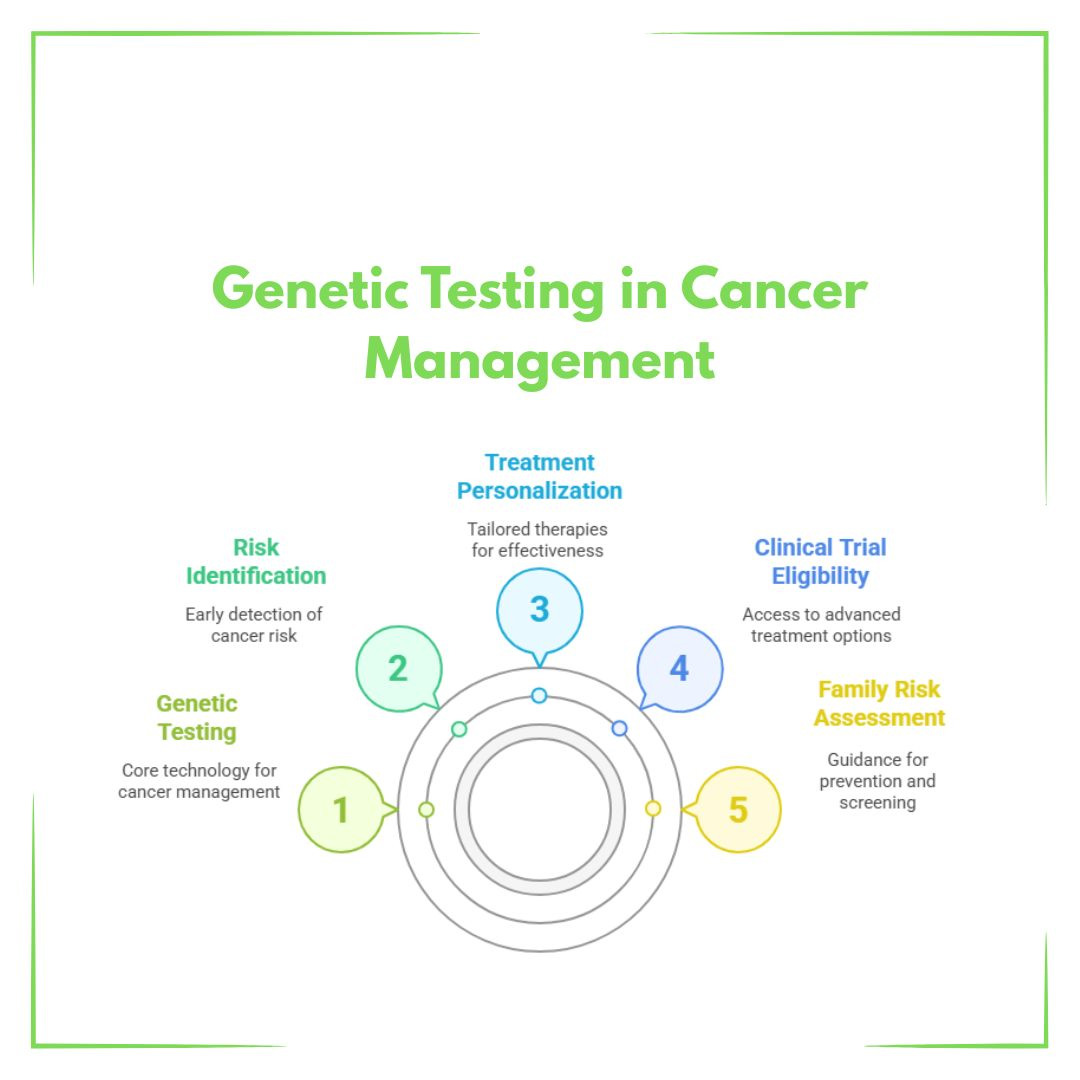Can You Inherit Cancer? – Understanding Genetic Testing

When a patient first hears the word “cancer,” it naturally sparks a whirlwind of emotions — fear, confusion, and often, the question: “Did I inherit this?” It’s a common concern, especially when there’s a family history of cancer. As an oncologist, I hear this question all the time, and the short answer is: sometimes, yes. But it’s more nuanced than you might think.
Let’s talk about what it means to inherit cancer risk, how genetic testing works, and most importantly — what you can do with the information.
What Does It Mean to Inherit Cancer Risk?
First, let’s clear something up: you don’t “inherit cancer” in the same way you might inherit eye color or your grandmother’s dimples. What you might inherit, however, is a higher risk of developing certain cancers due to DNA changes— gene mutations.
Think of your genes like the instruction manual for your body. Each cell reads this manual to know how to grow, divide, and repair. If there’s a typo — a mutation — it might tell cells to grow when they shouldn’t, or not to stop growing when they’re supposed to. That’s when problems can start.
Now, most cancers happen due to random mutations that build up over a person’s lifetime — through aging, environmental exposure, smoking, poor diet, and so on. However, about 5% to 10% of cancers are linked to inherited gene mutations passed down from a parent. That’s where the idea of “hereditary cancer” comes in.
Examples include BRCA1 and BRCA2 mutations linked to breast and ovarian cancer, or Lynch syndrome which increases the risk for colorectal and other cancers.
Why Should You Consider Genetic Testing?
Imagine sitting in a waiting room after your mother or brother is diagnosed with cancer. You’re thinking: “Am I next?” This is where genetic testing becomes more than science — it becomes a proactive tool for your future.
Genetic testing can tell us if you carry a mutation that raises your risk for certain cancers. But more importantly, it helps us take control. If we know there’s a higher risk, we can screen you earlier, more frequently, or even take preventive steps that save lives.
For instance, someone with a BRCA mutation might choose enhanced breast screening or even preventive surgery. It’s not just about “if” you’ll get cancer — it’s about stacking the odds in your favor with knowledge and preparation.
What Happens If Your Genetic Test Is Positive?
Let’s say your test comes back showing a mutation. That can feel heavy. I’ve seen patients go through a range of emotions — relief at having answers, fear about what it means, even guilt about potentially passing something to their kids.
Here’s what I always say: knowing is power. A positive result doesn’t mean you’ll get cancer — it means we have a chance to watch more closely, act earlier, and prevent more effectively. It might mean more frequent screenings, lifestyle changes, or medical treatments that reduce your risk.
And you’re not alone. Genetic counselors, oncologists, and support groups can help you process the information and decide your next steps.
What If Your Genetic Test Is Negative?
A negative test can bring a sense of relief, but it doesn’t mean you’re completely in the clear. You could still be at risk due to lifestyle or environmental factors — or other genes we haven’t discovered yet.
We continue monitoring you based on your family history and general screening guidelines. In many ways, it’s like flying with better visibility — we know where the clouds are and how to avoid the storm.
Can You Inherit Cancer Without Knowing It?
Absolutely. Some families don’t talk openly about health issues, or records get lost over generations. You might not know your grandmother died of ovarian cancer or that your uncle had colon cancer in his 40s.
That’s why your doctor may ask detailed family health questions that feel personal. We’re not being nosy — we’re building a map of risk so we can protect you better.
Common Questions About Inherited Cancer
Q: "Can cancer skip a generation in families?"
A: Yes, it can. Inherited mutations may be passed on even if one generation doesn’t develop cancer — due to lifestyle, luck, or early death from unrelated causes. The risk continues in the family line.
Q: "Should I get tested if no one in my family has had cancer?"
A: Not necessarily. Genetic testing is more helpful when there’s a strong family history. But if you’re concerned, talk to your doctor — they may recommend testing based on other factors.
Q: "Can I do anything to lower my inherited cancer risk?"
A: Yes. While you can’t change your genes, you can change your environment and habits. Healthy diet, regular exercise, screenings, and in some cases, medications or surgery can lower your risk.
Q: "Is genetic testing expensive or painful?"
A: It’s usually a simple blood or saliva test. Many insurance plans cover it if there’s a medical reason. Genetic counselors can help you navigate costs and insurance.
Final Thoughts: What You Do with the Information Matters Most
Cancer isn’t always inherited, but knowledge can be life-saving when it is. Genetic testing gives us a flashlight in the dark. It doesn’t take away the risk but gives you a map.
If you’re worried about your risk or have a family history of cancer, don’t sit with that fear in silence. Talk to a specialist. Ask questions. Get the facts.
You’re not alone in this. I’ve walked this path with many patients — from the anxiety of waiting for test results to the relief of having a clear plan. If you’re ready to take the next step, reach out. Schedule a consultation with an oncologist and let’s start the conversation about your health, your family, and your future.
